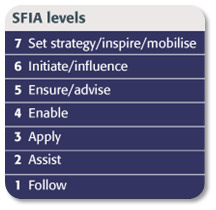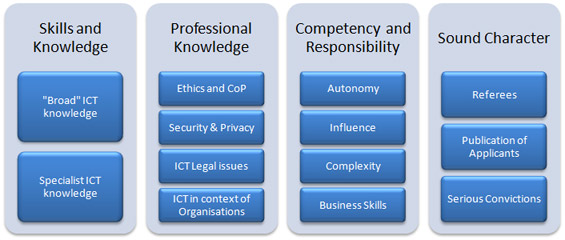 CITPNZ Entry requirements
CITPNZ Entry requirements
The primary requirement for CITPNZ is that an applicant can show genuine results operating at SFIA Level 5. The application process guides you through providing evidence of each step.
 The CITPNZ level
The CITPNZ level
The Skills Framework for the Information Age (SFIA) is a competency and skills matrix used by the IT industry in over 100 countries to assess and match IT skills. It is overseen and administered by the SFIA Foundation.
As well as defining 96 IT-related skills, SFIA defines 7 levels of responsibility and competency. Level 1 (Follow) outlines practitioners at the start of their career, where they have no responsibility for outcomes and someone else signs off on their work. Level 7 (Strategic) outlines those who are ultimately responsible for a large area of work and operate at a strategic level.
Chartered IT Professional assesses applicants to Level 5 of SFIA (Ensure/Advise) or above. Those operating at Level 5 have the experience and training to be able to provide professional IT advice and be responsible for major outcomes.
So the CITPNZ level if defined as:
Autonomy
Works under broad direction. Is fully accountable for own technical work and/or project/supervisory responsibilities. Receives assignments in the form of objectives. Establishes own milestones and team objectives, and delegates responsibilities. Work is often self-initiated.
Influence
Influences organisation, customers, suppliers and peers within industry on the contribution of own specialism. Has significant responsibility for the work of others and for the allocation of resources. Makes decisions which impact on the success of assigned projects i.e. results, deadlines and budget. Develops business relationships with customers.
Complexity
Performs a challenging range and variety of complex technical or professional work activities. Undertakes work which requires the application of fundamental principles in a wide and often unpredictable range of contexts. Understands the relationship between own specialism and wider customer/organisational requirements.
Business skills
Advises on the available standards, methods, tools and applications relevant to own specialism and can make correct choices from alternatives. Analyses, diagnoses, designs, plans, executes and evaluates work to time, cost and quality targets. Communicates effectively, formally and informally, with colleagues, subordinates and customers. Demonstrates leadership.
Facilitates collaboration between stakeholders who have diverse objectives. Understands the relevance of own area of responsibility/specialism to the employing organisation. Takes customer requirements into account when making proposals. Takes initiative to keep skills up to date. Mentors more junior colleagues. Maintains an awareness of developments in the industry. Analyses requirements and advises on scope and options for operational improvement. Demonstrates creativity and innovation in applying solutions for the benefit of the customer.
More details in the SFIA Section.
Other requirements
The level above is the core requirements of an applicant for CITPNZ, however the assessment also looks at other related areas:

This requires the following (shown in detail below):
- Broad ICT knowledge is assessed via either peer review by a subject expert or a formal test, exploring the fundamental concepts underpinning IT.
- Specialist ICT knowledge focuses on two specific IT skills or competencies, again using SFIA level 5.
- Professional knowledge looks at the non-technical general professional knowledge senior IT Professionals should hold.
- Competency and responsibility uses the SFIA level 5 definition above.
- Sound character is important – the public need to be able to have confidence in IT professionals.
CITPNZ is targeted towards senior professionals who are responsible for IT systems, projects and other significant work. Others in the team may find Certified Technologist more suitable.
Requirements of Area 1: Skills and Knowledge
Applicants must demonstrate suitable Skills and Knowledge to competently and successfully carry on work as an IT Professional.
- Broad knowledge of the skills related to their ICT area of expertise. and
- Specialist knowledge and operating at Level 5 of two specific SFIA skills as outlined in the SFIA Framework.
Requirements of Area 2: Professional Knowledge
Professional Knowledge covers the non-technical knowledge aspects of being a professional.
The detailed Professional Knowledge Curriculum for this area is developed and maintained independently and contains the professional knowledge requirements for the following areas:
- Ethics and Code of Practice
- Understanding of concepts of Security and Privacy
- Knowledge of ICT Legal Issues
- ICT Professionals in an Organisational Context
Requirements of Area 3: Competency and Responsibility
This focuses on whether an applicant meets the
Note that the subjective SFIA definitions below paint a picture of the sorts of expectations of someone operating at Level 5 of the Framework. This should NOT be used as a checklist – applicants do not need to meet all of the requirements listed, just those relevant to their position.
A requirement of Area 4: Sound Character
In addition to the entry requirements, applicants must be of Good and Sound Character.
Provision of two referees
An assessor will conduct a short and confidential telephone interview with two referees provided by the applicant. The referees also complete a brief written assessment of the applicant, confirming their work.
Referees are asked a number of questions related to how well they know the applicant and whether in their professional opinion the applicant is of a sound character, suitable for accreditation. The assessment team may also contact others who may know or have known the applicant to further assess their character, or whether they are operating at the required level.
Publication of applicant’s name to IT community
The applicant’s name will be published prior to award, with a request that any member knowing of any reason the applicant should not advance to provide this in writing.

